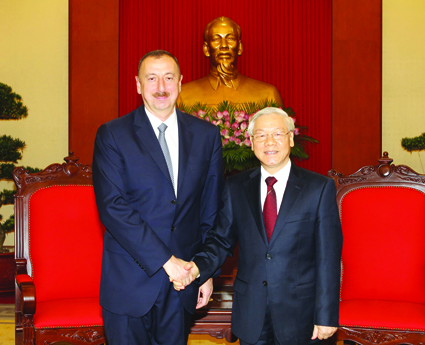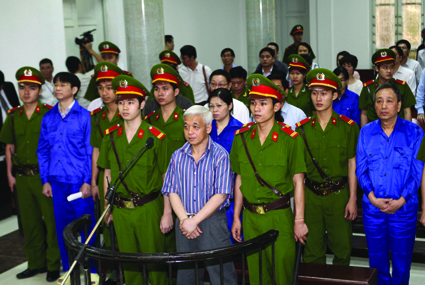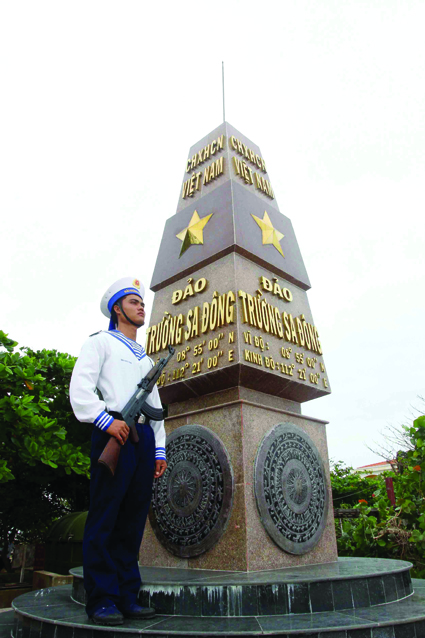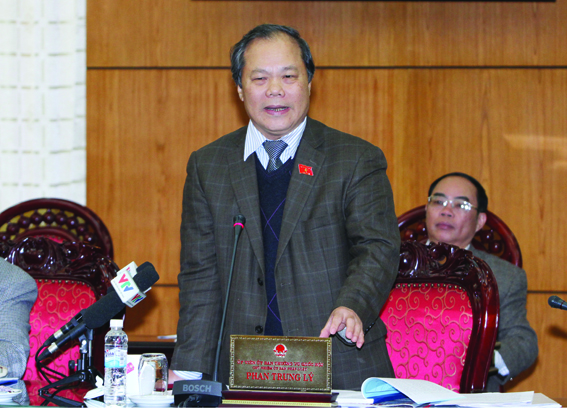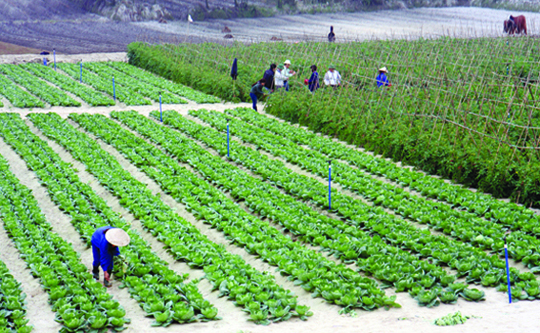During its month-long 7th session opened on May 20, the National Assembly (NA) passed the Law on Entry, Exit, Transit and Residence of Foreigners in Vietnam.
Under the 55-article law, which will take effect on January 1, 2015, foreigners holding more than one passport can use only one passport to enter, exit, transit and reside in Vietnam.
The law states that visas granted to foreigners will be valid for between 30 days and five years, instead of 12 months under the current regulations.
Foreigners as well as Vietnamese nationals abroad and their foreign spouses, offspring and parents will be exempt from visas if they hold temporary or permanent residence cards.
Foreigners who are spouses, offspring or parents of Vietnamese citizens residing in Vietnam will also be exempt from visas.

Under the law, foreign scientists and experts who temporarily reside in Vietnam will be considered for permanent residence.
Permanent residence permits will only be granted to foreigners who have made contributions to national independence, democracy and peace or those who are spouses, offspring or parents of Vietnamese citizens residing in Vietnam.
The law prohibits acts of abusing entry, exit, transit or residence in Vietnam to oppose the Vietnamese State or infringe upon the lawful rights and interests of agencies, organizations and individuals; or forging papers, using forged papers or providing untruthful information or documents to enter, exit, transit or reside in Vietnam.
At this session, the NA also passed the Law on Public Investment and the amended laws on inland waterway navigation, construction, bankruptcy, marriage and family, notarization, customs, nationality, and environmental protection.
Debating draft amendments to the Enterprise Law, the deputies asked for detailed provisions on which business lines are allowed and which are restricted for the purposes of national defense, security, social order and safety and health of the community.
They agreed that the law should comply with the 2013 Constitution for creating a legal framework for restructuring enterprises, especially state-owned ones, and create conditions and motive force for developing enterprises during the international integration process.
Deputy Mai Thi Anh Tuyet from An Giang province proposed the revised law create favorable conditions for all economic sectors and enterprises to enjoy their rights of doing business.
The deputies also agreed on the provisions on social enterprises, saying such provisions would encourage enterprises to join hands with the Government in solving social and environmental issues through contributing their resources.
However, they proposed the revised law detail the activities of social enterprises so as to prevent enterprises from deliberately transforming themselves into social enterprises to enjoy priorities.
Regarding the revised draft Law on Enforcement of Civil Judgments, deputy Tran Van Do from An Giang province disagreed with the draft’s provision empowering the court to issue judgment enforcement decisions, explaining that the court is a judicial body while the judgment enforcement body is the law enforcement one. He stressed the need to intensify control between the court and the judgment enforcement body.
Some deputies suggested the draft law retain the provisions on the competence and responsibilities of people’s courts as prescribed in the current law while ensuring a mechanism for people’s courts to take responsibility for judgments or decisions they have pronounced.
Most NA deputies agreed that changes were needed in the Investment Law to accelerate the administrative reform and create an attractive and transparent investment environment.
Deputy Do Thi Hoang from Quang Ninh province said the revised draft law on investment should clarify criteria for foreign holding of over 51 percent of an enterprise’s charter capital, adding that such required careful consideration in order to prevent foreign investors from circumventing the law that limits their role in certain sectors.
Deputy Mai Thi Anh Tuyet from An Giang province proposed stricter provisions on incentives for investors to avoid loopholes for enterprises to exploit, and clearer provisions on the State’s cessation of investment in enterprises in specific cases. She pointed to the unscientific and irrational provisions on the rights of investors.
NA deputies agreed that the Housing Law needed revising due to shortcomings that have led to uncontrolled and unplanned housing projects, shortage of housing for low-income earners and a surplus of high-end housing.
They said the revised law was necessary not only to protect people’s rights to own homes but also to increase favorable conditions for enterprises to develop sustainably.
Deputy Ho Thi Thuy from Vinh Phuc province said the revised law set the criteria for housing policies for low-income earners by creating favorable conditions for civil servants, students and workers to have easier access to houses.
She said the revised law had transparent and clear provisions and would help prevent corruption in the real estate market.
Deputy Dinh Thi Mai Lan from Cao Bang province said the law reflected the State’s concern about vulnerable groups in society by giving them the chance to own a low-cost house.
The revised law should tackle the issue of housing for civil servants and public employees, deputy Tran Ngoc Vinh from Hai Phong city said, explaining that currently the policy only benefited certain people, while it should be able to meet the needs of a much wider group, including public employees living in remote and poor areas.
Many deputies agreed with the provision of the revised draft Law on Real Estate Business that allowed foreign individuals and organizations and overseas Vietnamese to take part in real estate trading, saying this would not only create a competitive environment but also help generate jobs.
Deputy Phung Duc Tien from Ha Nam province said the law should also have binding conditions to ensure state control of property management and territorial security.
Tuan suggested not allowing foreign individuals and organizations to do business in areas sensitive for national defense and tightening the provisions on approval of projects.
Deputies agreed that the law allow real estate investors to lease or sell future assets and investors could advertise or sell their products by any way they chose without a real estate trading floor.
During the question-and-answer sessions which lasted for two and a half days, Government Inspector General Huynh Phong Tranh was questioned on officials’ declaration of assets.
NA members expressed concern that despite inspectors ordering large amounts of money or land to be confiscated in some cases, little was reported later, especially in major corruption cases.
Tranh agreed, saying that during 2008-11, only 30 percent of the money and 20 percent of the land which had to be handed over actually was.
He also acknowledged there were difficulties in confiscating assets after announcements, saying that inspectors often had their hands tied.
The inspector general proposed the Government to consider issuing a regulation to freeze assets when necessary.
Minister of Justice Ha Hung Cuong reaffirmed the judicial sector’s effort to reduce the number of civil cases left unsettled and coordinate with other agencies and ministries in settling major cases in hot spots such as Hanoi, Ho Chi Minh City and Tay Ninh and Dong Nai provinces.
There were often obstacles in seizing the property of those involved in major corruption cases, Cuong said, attributing to coordinating agencies such as civil judgment enforcement bodies and prosecution bodies.
Minister of Finance Dinh Tien Dung confirmed that his ministry would support small- and medium-sized enterprises (SMEs) to overcome difficulties and recover business activities after the recent economic recession.
“In the time to come, the ministry will ask competent authorities for extension of the tax payment time limit and exemption from personal income tax for owners of Vietnamese fishing vessels and Vietnamese sailors in foreign ships,” Dung said, adding that the ministry would strengthen measures to prevent tax fraud, creating a level playing field for enterprises.
Answering deputies’ queries on the ministry’s implementation of public-private partnership (PPP) projects, Dung said the ministry had worked with the Ministry of Planning and Investment in making a list of PPP projects as well as selecting investors, inspecting their financial capacity and examining the implementation of these projects.
Minister of Education and Training Pham Vu Luan clarified issues related to education quality, particularly in higher education and vocational training, and plans for educational reforms.
To improve the education quality, the education and training sector planned to organize training and retraining courses for teachers in order to gradually change methods of teaching and holding exams as well as assessing teachers toward promoting the capacity of pupils, Luan said.
The ministry also proposed the NA to revise policies toward students and pupils in teachers’ training schools as a measure to raise the education quality, he added.-



